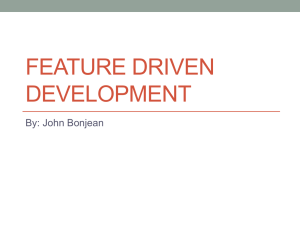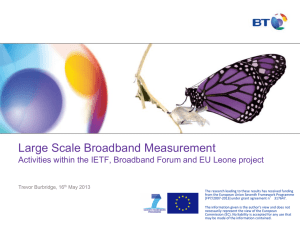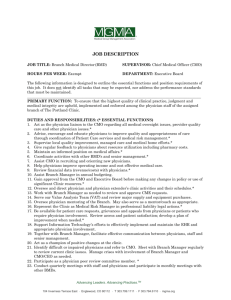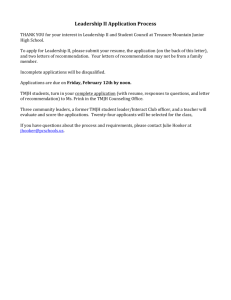(BBF) Programme Review Final Report May 2014
advertisement
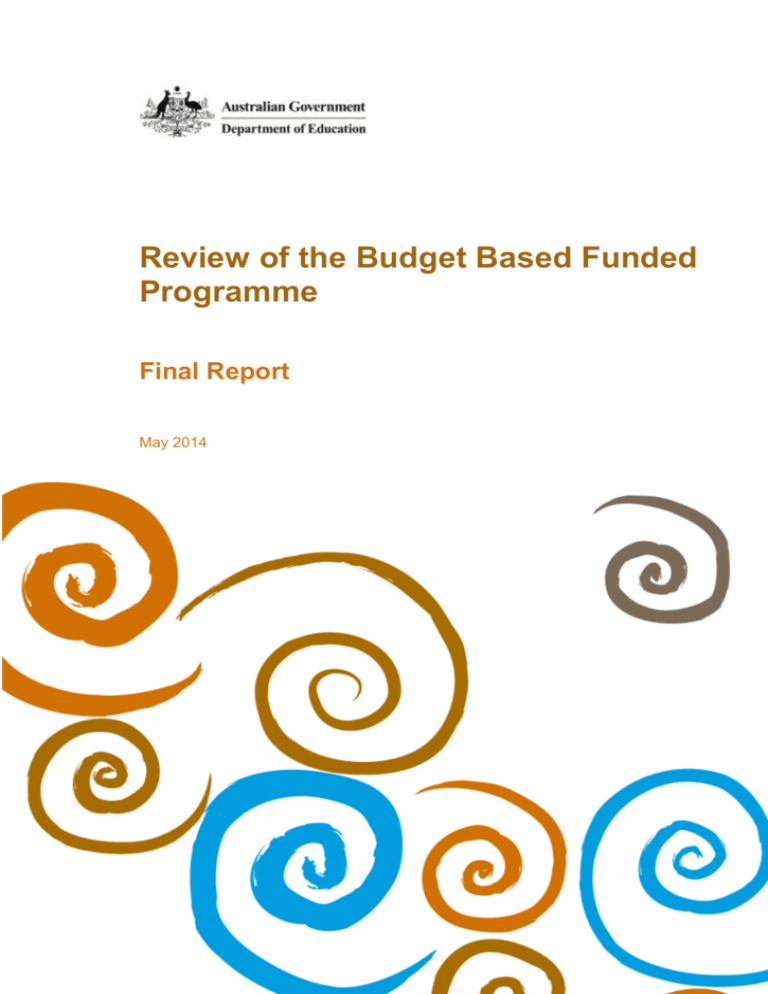
Review of the Budget Based Funded Programme Final Report May 2014 Review of the Budget Based Funded Programme Final Report 1 Contents 1 Executive Summary ............................................................................................. 2 2 The Review Context ............................................................................................. 4 3 Review Process .................................................................................................... 6 4 Review Findings ................................................................................................... 8 5 Recommendations .............................................................................................. 10 6 Conclusion.......................................................................................................... 16 Review of the Budget Based Funded Programme Final Report 1 1 Executive Summary Since its establishment in 2003, the Budget Based Funded (BBF) Programme has contributed around $61 million per year to the operational costs of approximately 340 child care, early learning and outside school hours care services in approved locations around Australia. This first major review of the BBF Programme has been undertaken to ensure that the programme is: properly targeted at communities where services may not otherwise exist assisting in the delivery of quality child care and early learning services for children, families and communities achieving better outcomes for children (particularly in regional and remote areas) supporting services to become more financially sustainable helping services move towards meeting the requirements of the National Quality Framework (NQF). The emphasis was to determine how to: better support improvements in service quality respond to changes in communities and the early childhood sector since the programme was first established better target the programme to support access by families and children to early learning services where they would otherwise not be viable or available develop a sustainable funding approach, within the existing programme budget allocation, that supports building the capacity of services. The former Department of Education, Employment and Workplace Relations released the Discussion Paper, ‘Quality Early Education and Care for Children in Regional, Remote and Indigenous Communities: Review of the Budget Based Funding Program’ on 19 July 2012, with written submissions accepted until 21 September 2012. PricewaterhouseCoopers was engaged to assist the department to undertake the consultations and analyse submissions. In May 2013, a summary of the public consultations was released. Some of the main issues raised included: the importance of embedding quality and improving provider practices Review of the Budget Based Funded Programme Final Report 2 the need for greater flexibility in programme administration to support forward planning in order to meet community need the relevance of the current programme’s objective and scope, in respect to its history of being an amalgam of several earlier programmes. The review found that the programme plays a vital role in the communities it operates in, particularly in regional and remote areas where it is the only child care and early learning service available for families. Evidence indicates that participating in a quality early childhood education programme can significantly increase positive educational and life outcomes for children, especially those from a disadvantaged background. Stakeholders’ submissions clearly expressed how valuable these services are for vulnerable and disadvantaged children. In this context, it is important that taxpayers' funds are used as efficiently as possible to target and reach the areas of highest need. Key findings included that the BBF Programme needs to: continue to support quality improvements in services reduce administrative and regulatory burden for services provide funding on an equitable basis reflect changes that have occurred in communities and within the early childhood sector since the programme was first established. Some services consider BBF as a permanent source of funding. Where a community grows and other child care and early learning options become available, funding from the BBF Programme needs to be reconsidered. BBF could continue to support services, but in a way that helps services transition to more permanent and sustainable funding, such as Child Care Benefit (CCB) approval and towards generating an income. The review was finalised with eight recommendations: Recommendation One - Introduce an outcomes based performance management framework including performance standards and key indicators. Recommendation Two - Develop and introduce a quality improvement strategy to enable services to progressively meet the requirements of the National Quality Standard, building on the BBF Quality Measure. Recommendation Three - Streamline and improve efficient practice and reduce administrative burden for services and the department. Recommendation Four - The programme objective and name be changed to provide a more definitive description of the programme with clear purpose and expectations. Recommendation Five - The programme focus specifically on supporting services in geographical locations where there are no other child care and early learning services. Recommendation Six - A formula-based approach to funding be adopted for the programme to provide a more coherent and equitable means of funding allocation. Recommendation Seven - A service fee requirement be introduced, with the fee to be determined by the service provider based on the profile of the community and families attending the service. Recommendation Eight - Services are encouraged and supported to become approved to administer CCB where it is feasible for them to do so. Recommendations are presented in detail in Chapter 4. Review of the Budget Based Funded Programme Final Report 3 2 The Review Context Background Historically, BBF services were established under several different programmes, dating back to the 1970s, and consolidated into the current BBF Programme in 2003. Most BBF services are located in rural and remote communities where the market may not otherwise support the viable operation of a service. Many BBF services are the sole providers of early learning in their community. There are also a number of BBF services in metropolitan areas, where prior to the implementation of the National Quality Framework there was an additional need for culturally competent services for Aboriginal and Torres Strait Islander children and families. A range of services are funded across Australia and although each BBF service is unique, they can be broadly grouped into five main types: centre-based services, including Multifunctional Aboriginal Children’s Services, crèches and flexible/innovative services outside school hours care and enrichment programmes Indigenous playgroups mobile child care services, including those that visit regional and remote areas and provide flexible children’s sessions, playgroups, vacation care, on-farm care, or parenting support other services, for example nutritional programmes, toy libraries and school lunch services. An annual, capped allocation of approximately $60 million per year is provided to BBF services, assisting them in meeting costs associated with operating a service. The programme is closed to applications for the establishment of BBF services in new locations; irrespective of growth in communities or demand for services. BBF services do not fall within the scope of the National Quality Framework (NQF). However, around one quarter of services funded under the programme are separately licensed under state or territory child care regulations, depending on each jurisdiction’s legislative arrangements for child care and early learning service providers not covered by the NQF. Services funded under the BBF Programme are not generally approved to administer CCB on behalf of families, and families using these services are not eligible to receive CCB or Child Care Rebate (CCR) to assist them with the cost of their fees. Fee policies vary across services depending on the profile of the local community. Some BBF services do not charge fees, while others charge minimal fees or market rates. Review of the Budget Based Funded Programme Final Report 4 The Budget Based Funded Quality Measure Historically, a difference in quality has existed between BBF services and those approved to administer CCB. In recognition of this, some BBF services are being supported to move towards the National Quality Standard through the BBF - Improved Standards Measure (the Quality Measure). The Quality Measure targets centre-based long day care type BBF child care services. This includes Multifunctional Aboriginal Children’s Services, crèches and those flexible/innovative child care services that provide long day care. The Quality Measure supports BBF services to improve against three key areas of the National Quality Standard: infrastructure – improving the quality of the facilities from which BBF services operate workforce – improving the qualifications of staff working in services through the flexible delivery of training governance – supporting services to strengthen their governance and administrative capacity. The 2014 Review of the National Partnership Agreement on the National Quality Agenda for Early Childhood Education and Care will consider whether BBF services should be included in the NQF. Investment in the Quality Measure is in recognition of the varying levels of quality delivered by BBF services, and that the best way to address this is by working closely with individual services on their particular needs. Rationale for the Review As the BBF Programme was formed from several pre-existing programmes, the current mix of BBF services is very diverse. The programme is an amalgamation of different programme and policy goals. The BBF Programme largely reflects past policies rather than a contemporary vision of how best to meet child development and early learning needs as well as family and community needs in the sector. In 2010, Australian National Audit Office produced a report into BBF Multifunctional Aboriginal Children’s Services and Crèches. The audit recommended that the department review the programme’s funding model to be more responsive to the demand for child care in non-viable markets and the performance of existing service providers. A wide-ranging examination of the programme’s design was undertaken to inform the review process. The aim has been to ensure that the programme meets current and future community needs and delivers quality child care and early learning services and outcomes for children, families and their communities. Review of the Budget Based Funded Programme Final Report 5 3 Review Process Stakeholder Consultations The Discussion Paper for the review, ‘Quality Early Education and Care for Children in Regional, Remote and Indigenous Communities: Review of the Budget Based Funding Program’, was released on 19 July 2012 with written submissions accepted until 21 September 2012. PricewaterhouseCoopers was engaged by the department to assist with the consultations and analyse submissions. Public consultations with stakeholders, including BBF service providers, community groups, peak bodies, academics and all relevant levels of governments were held from 25 July to 14 September 2012. The consultations took place in 33 communities in all states and territories with over 400 people participating and 38 written submissions received. The public consultations sought the views of stakeholders on the current operation of the BBF Programme and explored future options for design and delivery of the programme in relation to the following themes: programme objectives funding service delivery challenges service expectations, performance and reporting quality. Stakeholders were asked to consider how the BBF Programme could better: support improvements in service quality target support for improved access to child care and early learning services in locations or circumstances where the market would otherwise fail to deliver services respond to changes in community needs and circumstances over time support increased participation in child care and early learning services, especially for vulnerable children support better family and community engagement with child care and early learning programmes. Following the public consultations, PricewaterhouseCoopers conducted a broad based assessment of the programme, considering feedback from the consultations and written submissions, and provided options for consideration in the review. Feedback from the consultations highlighted the need to develop a sustainable, transparent and equitable approach to the funding of all BBF services that recognised services in greatest need. In response, PricewaterhouseCoopers developed a proposed funding model and undertook extensive data modelling. Review of the Budget Based Funded Programme Final Report 6 Stakeholder Reference Group To discuss the issues raised and potential options for the programme, the department established a Stakeholder Reference Group. The reference group comprised peak bodies representing the various service types funded by the programme, as well as national groups with an interest in child care and early learning. Reference group members included representatives from the following organisations: Australian Community Children’s Services Early Childhood Australia First Peoples Education Advisory Group National Association of Mobile Services for Rural and Remote Families and Children Early Years Education and Care – Central Australia National Out of School Hours Services Association Playgroup Australia SDN Children’s Services Secretariat of National Aboriginal and Islander Child Care Indigenous Education Consultative Bodies. The reference group met several times in 2013, providing valuable feedback. The department evaluated the reference group feedback, the response from the public consultations and the PricewaterhouseCoopers options paper to finalise the review. To allow time for the BBF review findings to be properly considered, funding agreements were extended for existing providers until 30 June 2014. Machinery of Government Changes and Related Reviews Following the Machinery of Government changes after the September 2013 election, responsibility of the BBF Programme transferred to the Department of Education with crèches funded under the Stronger Futures in the Northern Territory National Partnership and Indigenous playgroups transferring to the Department of the Prime Minister and Cabinet (PM&C). On 17 November 2013, the Government asked the Productivity Commission to undertake a public inquiry into future options for child care and early childhood learning, with a focus on developing a system that supports workforce participation and addresses children's learning and development needs. Further to this, the Government has consolidated and streamlined Indigenous programmes in PM&C under an Indigenous Advancement Strategy. A review of the National Quality Framework for Early Childhood Education and Care is being undertaken by the Australian state and territory governments. The aim of the review is to ensure the goal of improving quality in education and care services is being met in the most efficient and effective way. All of these initiatives impact the BBF Programme. It provides a valuable service in many communities. It is important to ensure that BBF services are not viewed as delivering lower quality education and care or that they are not able (or expected) to provide a quality service to children. In light of this, a number of the review findings will be considered by the Productivity Commission as part of their inquiry. Review of the Budget Based Funded Programme Final Report 7 4 Review Findings Preliminary Findings and Response While many of the issues raised during the review required detailed consideration, the majority of stakeholders considered that there is a clear need to deliver quality services to children. While there was some difference of opinion about whether services were ready to be working at the National Quality Standard (NQS), the preliminary findings of the review were that BBF services needed to continue to work towards the NQS and that they needed support to do so. In addition, the manner in which services have been funded and the limited capacity of many services to raise funds through fees or other community contributions meant that many services had difficulty investing in educational resources or modern play equipment for their children. To ensure the continued improvement of child care and early learning through the programme a number of initiatives, which build on the Quality Measure, were implemented from July 2013. These included: all BBF services being invited to order educational resources and equipment to the value of $5000 introduction of a Quality Improvement Plan for BBF services, to enable them to undertake a voluntary self-assessment against the NQS additional funding provided to Indigenous Professional Support Units and Professional Support Coordinators to support interested BBF services undertake a self-assessment against the NQS. Final Findings The review found the programme clearly plays an important role in the communities it operates in, particularly in regional and remote areas where it is the only child care or early learning service. The stakeholders who provided submissions to the review clearly expressed how valuable these services are for vulnerable and disadvantaged children. Evidence indicates that participating in a quality early childhood education programme can significantly increase positive educational and life outcomes for children, especially those from a disadvantaged background. The review finds that the BBF Programme needs to: continue to support quality improvements in services reduce administrative and regulatory burden for services provide funding on an equitable basis reflect the changes that have occurred in communities and within the early childhood sector since the programme was first established. Review of the Budget Based Funded Programme Final Report 8 Given the programme’s role in providing early childhood services where the market would not support other services, the programme should support those services to operate, but not in a way that prevents them from generating income or transitioning to mainstream funding over time, where that is appropriate. Budget Based Funding should not be seen as a permanent source of funding for all services, particularly where a community grows and other CCB approved or other child care and early learning services are established in that area. The name ‘Budget Based Funding’ also does not reflect what these services do. The name reflects an approach to funding and is meaningless to those receiving the service and should be changed. A new programme objective and revised funding arrangements for services will set the framework for a more effective and efficient programme, and would be underpinned by the introduction of a performance framework that measures outcomes for children. These changes would better target the programme and reduce duplication with other Australian Government programmes that support family and community development. Introduction of significant changes requires a transition strategy. Since the review has been undertaken, the Productivity Commission has commenced its inquiry into child care and early childhood learning, and PM&C has undertaken a review of Indigenous programmes. The future of BBF services is being considered in these contexts. The department therefore recommends implementing Recommendation One, Two and the first part of Recommendation Three from July 2014, and the remaining recommendations, which include changing the programme name, objective and the approach to funding, be considered by the Productivity Commission as part of their inquiry into child care and early learning. PM&C may also note these recommendations as part of the review of Indigenous programmes. Review of the Budget Based Funded Programme Final Report 9 5 Recommendations Recommendation One Introduce an outcomes based performance management framework including performance standards and key indicators. Current monitoring and accountability arrangements for BBF services focus on administrative compliance and financial probity and not the quality or effectiveness of the service delivered. There are also inconsistencies in regulatory requirements, with some services subject to regulation in their state or territory if they are licensed. The 2010 Australian National Audit Office report into BBF Multifunctional Aboriginal Children’s Services and Crèches recommended the development of a performance management framework, including effectiveness/outcome performance indicators. During consultations, stakeholders proposed that reporting arrangements be improved to allow services to capture and communicate the additional work they do and the impact they achieve (e.g. innovation, engaging with families); and indicated a service’s performance should be measured in terms of these impacts and outcomes. In order to respond to the audit and the view of the sector, the department recommends an approach to performance standards and expectations that focuses on outcomes for children and families rather than financial probity and administration. An outcomes based performance management framework will enable better reporting of service delivery information which can be used by the department as part of the funding agreement management process. The framework should include performance standards and key indicators that will: provide clear expectations for service providers help to embed the practices of continuous quality improvement against the seven quality areas of the NQS ensure that service providers are accountable for the quality of service delivery enable services to better capture and communicate their achievements to the department. Key performance indicators may focus on the following programme outcomes: quality– to provide quality child care, early learning and school age care services that promote positive learning and development outcomes for children access – to ensure availability of and access to child care and early learning services in approved locations financial management – to build the management capability of child care and early learning services through best practice financial management. Review of the Budget Based Funded Programme Final Report 10 The performance framework would need to recognise any state or territory regulatory oversight of services to reduce duplication of reporting requirements. Reporting requirements should ensure a performance framework does not increase administrative burden on services. Recommendation Two Develop and introduce a quality improvement strategy to enable services to progressively meet the requirements of the National Quality Standard, building on the BBF Quality Measure. Currently, about one quarter of BBF services are licensed. As the majority of BBF services are not regulated under the NQF, little independent information on service quality is available. Support is available to BBF services to work towards the NQS through the Quality Measure and other activities implemented as a first response to issues raised during the review. Child care and early learning services in remote communities, including some centre-based BBF services, have received intensive training through the Remote Indigenous Professional Development Package to support them in delivering the Early Years Learning Framework. Stakeholders have expressed the view that delivering a quality service is a key priority for most providers. A majority of stakeholders believe the NQS is a strong and appropriate definition of quality for any child care and early learning service. There was also support for requiring services to have a broad plan or framework for continuous quality improvement. Many stakeholders also viewed culturally competent service delivery as a key objective of the BBF Programme, believing that providing a culturally strong service which families and children are comfortable with leads to family engagement and increased utilisation of the service over time. In order to embed quality and continuous improvement practices in BBF services including the provision of culturally competent service delivery, the review recommends that services should be required to: undertake self-assessment and complete a Quality Improvement Plan use an approved learning framework (Early Years Learning Framework for Australia and/or My Time Our Place – Framework for School Age Care in Australia) to inform the development of the service’s programme to enhance each child’s learning and development. The approved learning frameworks under the NQF recognise that from before birth, children are connected to family, community, culture and place, and the frameworks have been designed for use by educators working in partnership with children, families and the community to provide an experience that respects, celebrates and honours diversity. They have been developed to guide educators in developing quality programmes that support children’s learning and reflect the community in which the service operates. While BBF services are not currently part of the NQF, these requirements would help to ensure that services are outcomes focused, and deliver quality, culturally competent services for the benefit of all children attending services. Support will continue to be available to services. This recommendation supports services to continue their quality improvement journey. Review of the Budget Based Funded Programme Final Report 11 Recommendation Three Streamline and improve efficient practice and reduce administrative burden for services and the department. All BBF services are required to comply with the requirements and conditions outlined in their funding agreement, which are for a 12-month period. These requirements focus on administrative compliance and financial probity and limit the way services are able to use their funding. During consultations, stakeholders indicated that the 12-month funding agreements were too short, contributing to their inability to commit to longer-term investments and expenditure, or appropriately plan or save for larger investments to meet local need. The lack of longer-term funding inhibits service providers’ ability to attract staff. The review recommends changes to reduce administrative burden and improve the effectiveness of administrative obligations to benefit services and departmental management, including: offering funding agreements of up to four years, based on meeting a number of criteria allowing unspent funds to be carried across financial years within a funding agreement period, subject to conditions. These changes would reduce red tape for providers and bring the programme in line with other programmes. Services would also be able to make longer-term plans and investments for example, in staff, which would have outcomes for quality. Recommendation Four The programme objective and name be changed to provide a more definitive description of the programme with clear purpose and expectations. The current BBF Programme objective that was developed in 2003 is twofold. It provides for child care and early learning services in areas where the market would not normally allow services to operate, particularly in regional and remote communities; and where there is an additional need for culturally appropriate services for Aboriginal and Torres Strait Islander children and families. In order to maximise the reach of the funding available and ensure access to child care and early learning for families who have no other option, a more focused objective should clearly link this programme to the Government’s broader child care and early learning policy objectives and target smaller regional and remote communities where other services are not available. Under the NQF, all child care and early learning services are expected to be culturally appropriate, nurture the individual needs of each child in the service, and engage with local families and community. The review therefore recommends the programme objective give priority to regional and remote locations. It should emphasise quality, be limited to child care and early learning services (including out of school hours care services) and explicitly recognise the role of the programme in promoting learning and development outcomes for children. The objective could also focus the programme on building the capability of services into the future, and set out a clear expectation that services funded under the programme should continually improve service delivery and move towards sustainable funding models. Services can do this through building on their governance capability, improving quality, becoming CCB approved where it is feasible, or seeking other opportunities such as philanthropic or social investment. While some services would require Australian Government funding for many years to come, the incentive to seek other funding sources may provide growth and other opportunities for services. Review of the Budget Based Funded Programme Final Report 12 A new name for the programme would more effectively articulate this objective. In implementing this recommendation, a case-by-case assessment would be required to determine the services that no longer meet the programme objective. A transition strategy would support these services to move out of the programme, and to other, more suitable funding options, if appropriate. Recommendation Five The programme focus specifically on supporting services in geographical locations where there are no other child care and early learning services. During the 2012 consultations, stakeholders identified that programme funding should be provided based on need, i.e. based on the presence of other accessible child care and early learning services, socio economic disadvantage, vulnerability indicators and service delivery costs. The review recommends that services or communities be selected based on their alignment with the proposed objective. Criteria could be established to identify and determine approved priority locations for new services under the programme. These may include: the population of young children aged 0-4 years community interest and engagement in an early childhood service the absence of other early childhood services provided in the location whether the establishment of a service has the potential to leverage from other programmes/service delivery to provide a more comprehensive service to children and families the level of disadvantage of the community (through population indexes such as SocioEconomic Indexes for Areas, Australian Early Development Index and unemployment rates). Regular reviews of services funded under the programme could be undertaken, with the delegate able to change or extend service provision in approved priority locations, as appropriate, based on service performance, or clear community need or demand for a service. For example, if demand for a particular service is greatly reduced within the community, but there is clear demand elsewhere, the department would have the ability to respond by re-allocating funding and ensuring appropriate transition arrangements are in place. These principles are consistent with the responsibility of all Government bodies to use taxpayers' funds as efficiently as possible. Recommendation Six A formula-based approach to funding be adopted for the programme to provide a more coherent and equitable means of funding allocation. The programme currently makes a contribution towards the cost of service delivery. In some cases, the amount funded covers the entire cost. In the case of other services, the funding is only a portion of what the service needs in order to operate. Some consistency across service types and location is required. Further, the Australian National Audit Office performance audit of Multifunctional Aboriginal Children’s Services and Crèches (No 8. 2010-11) recommended that the department review the funding model to provide more flexibility in its application. Review of the Budget Based Funded Programme Final Report 13 Stakeholders in the 2012 consultations supported the introduction of a transparent and equitable approach to the funding of services and agreed that the funding model be updated to reflect changes in the sector since services were initially funded. Stakeholders emphasised the need to strategically target funding and resources to the areas of greatest need, where there is: a lack of other accessible services socio-economic disadvantage and vulnerability higher service delivery costs associated with regional and remote locations or in relation to a high proportion of children with additional needs attending the service. The review recommends that future funding allocation be based on transparent principles that support the programme objective and that a formula based approach should be adopted. Such an approach would help to prioritise need, and have the capacity to provide incentives to influence improving service quality. A formula-based approach to funding allocation could contain a formula for each of the three main service types funded under the programme: centre-based child care and early learning; outside school hours care; and mobile services. Recommendation Seven A service fee requirement be introduced, with the fee to be determined by the service provider based on the profile of the community and families attending the service. Under the current programme guidelines, funding recipients are required to have a fee policy but are not required to charge a fee. Some BBF services do charge fees, but these range from a minimal amount to some that charge full commercial fees. The 2012 consultation forums highlighted the range of reasons for the different levels of fee charging, with some services basing their charges on parental income, while others set a flat rate. Many stakeholders also stated that there is a reluctance to charge fees, as they believe it may create a barrier to participation. The review recommends that service providers charge a minimum fee per child per session, based on the profile of the community and the families who attend the service (i.e. the family’s capacity to pay). This will give flexibility to service providers by allowing them to set the fee taking into account their local context. The requirement to charge a fee supports the objective of improving the financial sustainability of services and assisting in establishing the value of the services provided for the families who use them. Implementing a fee would be a significant change for some services and for the families whose children attend. Services may need additional support to create fee structures that recognise the capacity of some families to pay, while providing the service at little cost to others. Recommendation Eight Services are encouraged and supported to become approved to administer Child Care Benefit where it is feasible for them to do so. Under current arrangements, most BBF services are not approved for the purposes of administering CCB on behalf of families, and families using these services are not eligible to receive CCB or CCR to assist them with the cost of fees. Review of the Budget Based Funded Programme Final Report 14 Eight BBF services are currently authorised to receive programme funding and operate as CCB approved services, and another service operates co-located CCB approved services. These services are regulated under the NQF. During consultations, many stakeholders acknowledged the potential for some BBF services to move towards becoming CCB approved, and some providers have indicated their willingness to consider this. It is important to acknowledge that operating a CCB approved service is not sustainable in some communities and only a small number of BBF services are likely to be able to transition to CCB approval under current arrangements. This is particularly the case in some remote locations due to population size, the capacity to pay fees when parents are not in employment, or transient populations. There is also a view among some stakeholders that it is not appropriate for BBF services to become CCB approved because of the perception that this would dilute culturally appropriate service delivery. Some stakeholders also believe that the administration required for CCB is too onerous for small services and the families who use them, and would lead to a reduction in use of the service. The review recommends that some BBF services transition towards CCB approval, in a planned and staged way, where it is feasible and sustainable in the long term without ongoing programme support. The NQF would then apply to those services. For those services that do transition, a supported and staged approach would mean that for a period, services would continue to receive some programme funding as well as CCB. Other support should be provided, tailored to the readiness of services to achieve and maintain CCB approval, including administering the new system and operating within the regulatory requirements of the NQF, without ongoing programme funding. Review of the Budget Based Funded Programme Final Report 15 6 Conclusion The review concludes that significant change is required to maximise the impact of programme funding so that as many communities as possible can benefit from a child care, early learning and/or outside school hours care service. Due to the long standing nature of existing funding, any changes to the programme should be undertaken in partnership with services to ensure the best outcomes for children and families. Additional support will be required to assist services adjust their service delivery, particularly in relation to quality. It also acknowledges that for some services there will be greater change required than others. Implementation of some recommendations from 1 July 2014 will allow services time to fully engage with the change management process and build confidence in the supports available. The timeframes will allow time to consider the outcomes and impacts from the Productivity Commission inquiry into Child Care and Early Childhood Learning. The 2014 Review of the National Quality Framework is now being undertaken, and like the Productivity Commission inquiry, this could have longer term impacts on the BBF Programme. The changes recommended should ensure the revised programme is able to deliver quality early learning environments for children in locations where service provision would be unlikely without the programme, giving them a strong start at school and for the future. Review of the Budget Based Funded Programme Final Report 16 Review of the Budget Based Funded Programme Final Report 4


